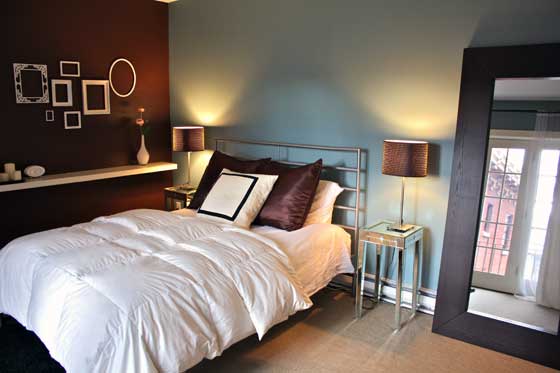How I generate extra income by letting strangers pay my rent
I almost never pay the entirety of my rent. I don't have roommates and I've never been evicted. In the four years I rented a one-bedroom New York City apartment, I paid the full rent only one month. I now own a condo in Portland, Oregon, and I almost never pay my mortgage.
I'm able to keep my condo and apartment because I let strangers pay my bills for me. I've created a situation where my home generates income.
Letting Strangers Pay My Rent
Here's how I did it in New York City for four years: I traveled nearly every week for my job as a management consultant. I was out of town Monday-Thursday most weeks. I reasoned that other people like me may have the opposite commute pattern, where work brings them to New York weekdays. I posted an ad on Craigslist for a “part-time roommate”, and sure enough, lots of people were interested in paying me for the privilege of staying in my cute, East Village apartment three nights a week while I was away.
With an aggressive savings plan and the money generated from my “roommates,” I was able to squirrel away enough money for a down payment on a condo in Portland, where property is much less expensive than in New York.
I purchased a reasonably-priced condo between the trendy Pearl District and Nob Hill areas. With permission from my company, I relocated to Portland for two months while working on a West Cost project. Living in Portland gave me the opportunity to decorate and fully outfit the condo. Before moving back to New York at the end of the project, I hired a local management company to handle advertising, tenant screening, and rent collection. The management company rents out my furnished condo to business people coming to Portland for 3-6 month stretches or people in town on extended vacations.
These are just a couple examples of ways people can turn their home into an income-generating asset. My circumstances are a little unusual, but the concept is nothing that can't work for nearly everyone in some capacity. In my experience, there are four main ways nearly anyone can leverage their apartment or home to generate income:
- Vacation Rental. When you know you'll be out of town for several days, post an ad for your home in the vacation rental section of Craigslist. Other great resources are AirBnB.com and SecondPorch (a Facebook application).
- Home Exchange. Consider doing a home exchange when you take vacations. If you have a home in Maine, you can potentially “swap” with a couple in Paris for a week or longer (fun fact: Europeans seem to love Maine). A great place to start is HomeExchange.com, a vacation swapping website.
- Room for Rent. If you have an extra bedroom in your home, consider listing it on a site like AirBnB.com, where travelers all over the world look for inexpensive accommodations.
- Part-Time Roommate. If you travel regularly for work, find someone with the opposite commute pattern who needs a place to stay in your home city. Craigslist and social media like Facebook and Twitter are great resources for this.
One Potential Scenario
To give a sense of the income potential of these arrangements, let's take an example of a couple who lives in a 2-bedroom home in Portland, Oregon. Assume they live in a fairly desirable area and use their spare bedroom as a home office and guest room.
- They rent their spare room to vacationers four nights a month, charging $50/night. Annual income: $2,400.
- Once a year, they take a 10-day vacation in Europe. This year, they opt for a home exchange, saving $150/night in hotel costs. Annual cost avoidance: $1,350.
- They usually go camping a couple times over the summer. They rent out their home two weekends each summer, charging $150/night. Annual income: $600.
- During the holidays, they travel cross-country to visit family. They rent out their home over Thanksgiving (four nights) and Christmas/New Year's (10 nights) at $150/night. Annual income: $2,100.
- Total annual income/cost avoidance: $6,450.
This is a fairly realistic scenario, with prices typical for Portland. Let's assume this couple earns the local median income of $56,000 for a two-person household. With minimal work and a little flexibility, this Portland couple is able to boost their income by nearly 12% annually.
To take this a little further, let's say they continue renting out their place, earning $6,450 annually for five years. They invest their income with an 8% annual return. At the end of five years they'll have $37,800. Then they have a baby, so they stop renting out their space. They convert the second bedroom into a nursery and stop taking long vacations. They leave the $37,800 in the investment account, which continues to earn 8%. By the time their child is 18 years old and ready for college, the account will be worth over $150,000, which should cover their child's Harvard education (assuming the kid is smart, like his parents). Not bad, right?

Is This Realistic?
Many people think that this story doesn't apply to them. They think either that no one would pay to stay in their home, or that it would be too weird to have strangers around their stuff.
When I first had these doubts, I had to tell myself: I like my home, don't I? Is it that far fetched a notion that someone else might, too? As for the aversion to having someone else around my stuff, I had to think through that reaction: Was I really willing to turn down hundreds or thousands of dollars of income because I wanted to protect my things from being near strangers? I had to discipline myself not to let my Stuff take over my life, limit my opportunities and cost me money.
After conquering my doubts, I forged ahead. Looking back, I have no regrets. My belief is there's no harm in trying — all the listing services I mentioned (except HomeExchange.com) are free. If you're curious to give this a try, spruce up your place, take some well-lit photos, and write a snappy ad. The more positive energy you put into your home and your ad, the more success you'll have. You'll likely be surprised at how many people are interested in paying to stay in your home, and you may even make some friends while you're at it!
A Final Word of Advice
Be sure to check your lease, zoning laws, or condo bylaws to ensure you're not violating any rules. Also, check with your homeowner's or renter's insurance policy to ensure you're covered for damage from renters and visitors.
Become A Money Boss And Join 15,000 Others
Subscribe to the GRS Insider (FREE) and we’ll give you a copy of the Money Boss Manifesto (also FREE)
